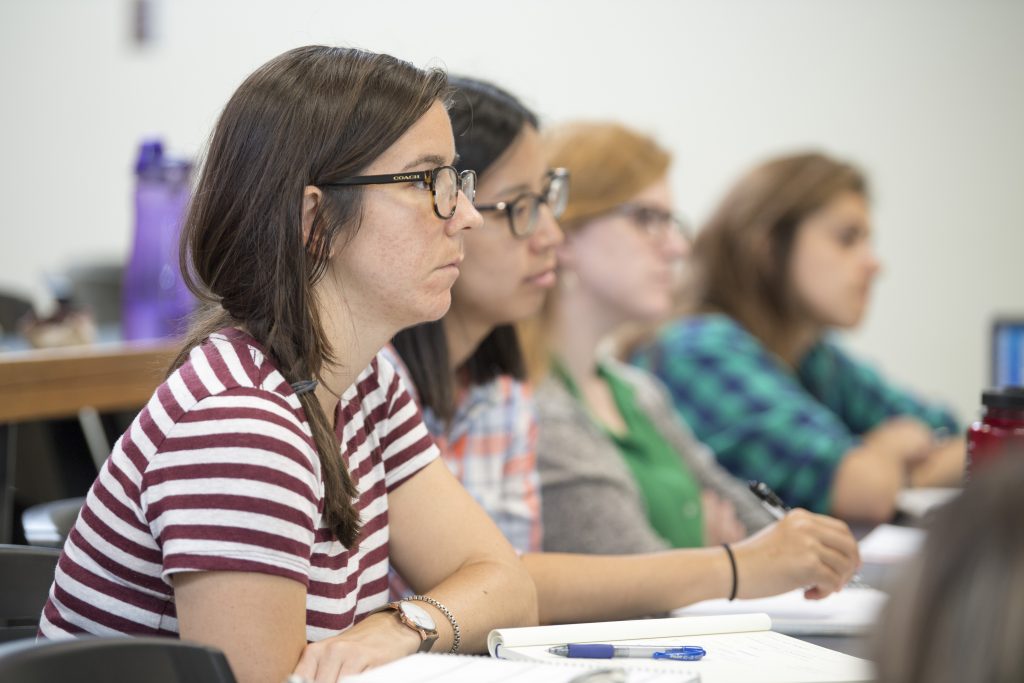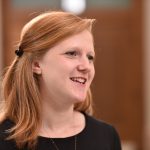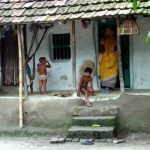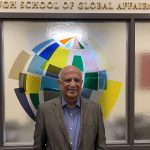When Leah Walkowski speaks, she affirms the core values of students in the Master of Global Affairs program – and demonstrates why there’s a growing community of Returning Peace Corps Volunteer (RPCV) students at the Keough School of Global Affairs.
It seems that in every language, including the Acholi of Northern Uganda and the regional Kiswahili that Walkowski (MGA ’19) learned, Keough students advance the values that Notre Dame’s “founding father” Rev. Theodore Hesburgh embraced. Hesburgh played a key role in helping to shape the Peace Corps in the early 1960s, achieved through his discussions with politician and diplomat Sargent Shriver as the service was established during the tenure of United States President John F. Kennedy.
“I think I was attracted to Keough because of the focus on the person,” said Walkowski, referring to the foundation of human dignity and integral human development that is the heart of the Keough mission. In that sense, she’s much like other students in the MGA program, this year with 72 students representing 33 nations.
Walkowski specializes in sustainable development, and offers vivid and animated descriptions of Sierra Leone and Ethiopia. It’s there she completed her Keough i-Lab experiences in Summer 2018, through a partnership with Harvard Medical School’s Program in Global Surgery and Social Change (PGSSC) and the Partners in Health project.

As an RPCV student, it’s her years of hands-on service in Uganda and Kenya that served as a springboard to continue her career at Keough. Walkowski’s Coverdell Fellowship options, offered through many institutions, seemed to fit best at Notre Dame.
“Peace Corps volunteers are great students for us,” said Michael Talbot, the associate director for Keough’s MGA program, which includes recruitment and admissions responsibilities. Talbot notes at least four RPCV students in the school, and about as many on the faculty and staff. “I’ve been really excited about the increased presence,” Talbot said, and he counts himself on the RPCV team too. His Peace Corps service in The Gambia is part of a pathway that included study in Guatemala and Belgium.
Talbot was in an early academic career when, like Walkowski, he felt he wanted more. “I was reading and talking but it seemed hollow,” he said. “I wanted a meaningful practical experience.” That yearning today is what’s behind Talbot’s commitment to the RPCV students at Keough – in fact, all students in the program, because their international field experiences are critical to their success.
The Keough values align closely with those learned in Peace Corps culture, which gave Walkowski a new but familiar context to contemplate her past experiences and education while placing them in service to a wider vision. A Minnesota native, it was her undergraduate work in anthropology at University of Wisconsin-Madison that sparked interest in a first short-term commitment in Nairobi and Embu, Kenya.
“It was an opportunity to be able to live with families and see a world so different from what I had known,” said Walkowski, whose internship in Kenya and early career plans were focused in global health. She wanted an immersive experience after graduation and returned to Uganda with the Peace Corps, where her community projects in Kitgum – in Northern Uganda, where she was based for two years – and beyond caused a pivot away from global health toward youth and gender issues.
I was so focused on international work, but I came home from Uganda and here I’d see a lot of the same challenges that are just as relevant and prevalent.
After returning to the United States, Walkowski continued urban youth work in North Minneapolis while making decisions about graduate school. “I was so focused on international work, but I came home from Uganda and here I’d see a lot of the same challenges that are just as relevant and prevalent,” she said.
For Walkowski, the advantages of Keough included an opportunity to deepen her search for personal as well as professional meaning. That led her to Ethiopia, but also to the PIH program in Sierra Leone, where the i-Lab field experience returned her to another health care setting.
Ethiopia meant working with better equipped surgeons and practitioners advocating for policy change. Sierra Leone, though, found her in a setting where there was one surgeon for a half-million people, and the resource constraints necessitated a community-based approach built on relationships and shared narrative. “I met so many people who found the spaces where they could see change,” Walkowski said.
It also created new layers within her, of seeking to understand how disciplines intersect, of how to find new connections in development that transcend the definitions of global health, or youth or gender, of choosing relationship first, of envisioning her future in sustainable community development beyond graduation.
It’s a search that resonates with Talbot, who completed a master’s degree in philosophy before a Peace Corps stint that led to a law degree and ultimately his own journey to Keough – facilitated, in fact, by the deep connections and lifelong relationships he cultivated while in The Gambia before his own RPCV life.
“You can study pretty much anything you want to study,” said Talbot, who noted that a part of the Coverdell program requires engagement with domestic organizations as well as international ones. So there’s plenty of room for stories like Walkowski’s, where both the scholar’s success and the servant’s search are integrated. There is as much diversity in Keough options as there is among its students.
“It’s cool to hear all these different experiences from all across the world,” he said.



